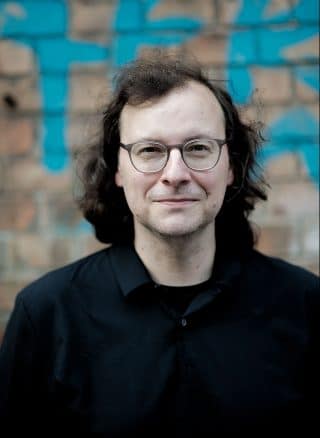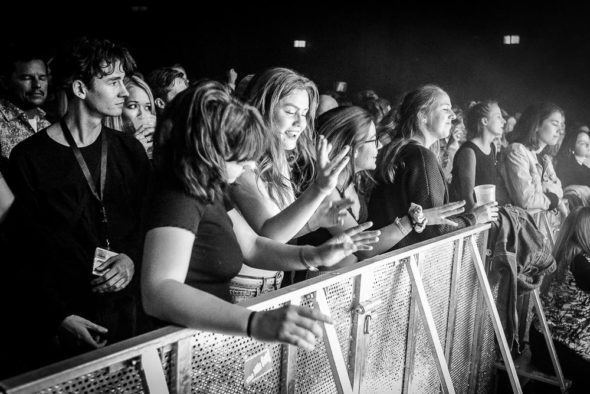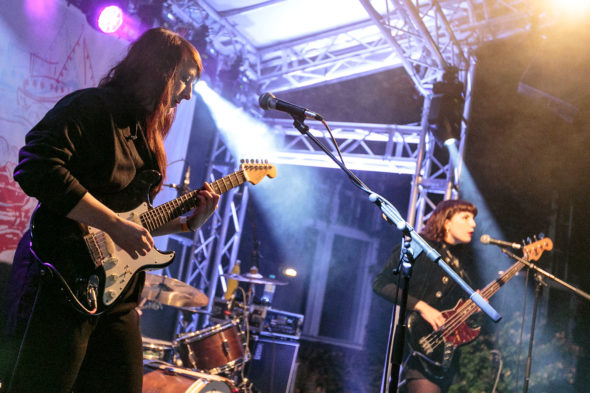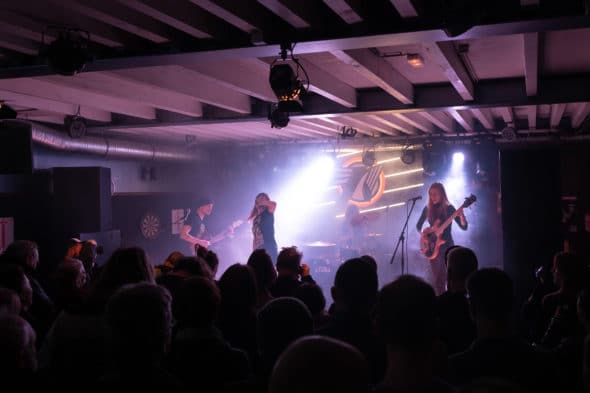
In February 2019 the composer PIA PALME and the musicologist CHRISTINA LESSIAK came together to meet the founder and director of the festival WAVES VIENNA, THOMAS HEHER for a chat. The conversation took place in a café in Vienna Margareten, close to the festival office. The topic of the conversation was the proportion of women on and behind the festival stages, the European initiative “Keychange” and WAVES VIENNA as the only Austrian music festival participating in the international network.
“It’s about setting an example”
Pia Palme: What is the situation with women’s participation at Waves Vienna?
Thomas Heher: We have been doing various activities for quite some time in order to grant women a greater visibility and offer them a platform at our festival. If you look at the numbers of the last few years, you can see that we have a relatively high percentage of women at the festival and a permanent team organising Waves which consists of 50 percent woman – if not more.
In 2016 we decided to fill our entire production team with women – with only one exception. All the stage managers, all of our own technicians were women in 2016. By doing this we wanted to set an example. When the percentage of women on stage is high, it’s kind of obvious and lot of attention is going to be aimed towards that. But when it comes to production, it will be completely ignored most of the time. Then it’s always: “Well, there are no sound engineers.” But that’s just not true. There are only a few female sound engineers in Austria – one has also worked for us – but there are more in training. Our campaign even encouraged the company we work with to rethink things a little.

In 2017 there were already three women involved and last year, in 2018, there were five. Same thing with the security company we worked with, which also has a few women in the team now. Aside from Waves Vienna, we also host the Electric Spring Festival at the MuseumsQuartier. We made a deal with with the security company that at least 40 percent of the security employees should be women. We even managed to get 72 percent of the stage staff to be women at the Electric Spring festival last year. This is mainly due to the curator Therese Kaiser.
“I am actually a big fan of quotas.”
Pia Palme: How did you get the idea to participate in “Keychange”?
Thomas Heher: Vanessa Reed from the PRS Foundation asked me at Eurosonic if we would like to be part of “Keychange”. I looked into it – and agreed. She really didn’t need to sell me on the idea because it is an important topic. Personally, I am actually a big fan of quotas. Not in the sense of being forced to fulfil a quota, but simply because it leads to a big discussion and this discussion contributes to raising people’s awareness. Only then people ask themselves why there is a need for a quota or what is the grievance behind it.
Similar things could be observed when there was a discussion about Austrian share of music on the radio. The discussion about the quota, even if it was only on a voluntary basis at the ORF radio stations, is a relatively hard issue to talk about. This probably got a lot of people to start thinking about the amount of Austrian music being played in our radios. If you only say “It should be played more often”, then the basis of communication is missing. It’s the same with gender balance on stage and in production. There is a lack of awareness. Apparently it’s not enough for big media outlets pick to it up and, for example, delete all men from the posters of big festivals in order to show how little of the line-up remains. There has to be a big discussion about a quota to simply get people to talk about it and create awareness. That is why I am a fan of quotas. Not because of the thing itself, but because quotas give us the chance to talk about them in concrete terms.
“There is a lack of awareness.”
Christina Lessiak: “Keychange” suggests different ways to calculate this quota. How do you do this?
Thomas Heher: When a woman writes the songs or is a lead singer, it’s a female act. The same applies when more than 50 percent of the members of a band on stage are women. If there are four people on stage and there’s a female singer and a female bass player, then it’s a “Female Act”. But if there is one male singer and one male drummer out of four people on stage, it is a “Male Act”. So it’s not enough for just one woman to be on stage for a band to be considered a “Female Act”.

Pia Palme: We wondered why you don’t just program women this way. Why is there a need for an initiative like “Keychange” to realize a women’s quota?
Thomas Heher: This is about visibility. It’s about setting an example and working together with multipliers – whether it’s media or organisations – to develop a communication topic you can hold onto. I assume that this was the reason why there was EU-funding for “Keychange”. It’s not about everyone submitting to thinking in quotas and making it a law. Sweden takes an interesting approach, for example. There, festivals that receive public funding must have a balanced line-up, otherwise they are not eligible for funding.
Pia Palme: This is often times rejected in Austria with the argument that the artistic freedom of the curators should not be affected.
Thomas Heher: In my opinion, a balanced line-up has nothing to do with artistic freedom, but with doing more work as a curator. That’s all. It’s about keeping an eye on the topic – and to be honest, if someone puts together a line-up in 2019 without considering this aspect, then she or he is out of date. The topic is socially and politically relevant and important and must be taken into account. It is not artistic freedom to simply disregard something like this.
Christina Lessiak: You often hear the argument that there are simply no more women in a particular music genre. The Graz Springfestival in 2018, for example, had a female share of 12.4 percent. How do you feel about that?
Thomas Heher: This is complete nonsense. People just don’t want to put the work and effort into researching. It’s definitely possible. So it’s a self-sustaining system – if you do nothing to change it. A festival is a snapshot, it represents a current state of music creation and of course has a very important function as a role model. A festival is a source of inspiration for the people in the audience. For example, when younger people come to listen at Electric Spring and only guys appear on stage, it sends a signal to the girls in the audience: “Making music is only for guys”. And that’s exactly where you have to start. Here, quotas are important in order to move the people in charge and force them to deal with quotas.
Pia Palme: “Keychange” ends in 2022. Can one still join?
Thomas Heher: As far as I know, you can join at any time. I assume that the EU funding programme will run until 2022 and then a programme to continue will be applied for. Incidentally, these funds will not go to us. We have no monetary benefit from it. It is, so to speak, the commitment on our part that we will participate. By the way, we don’t just pay attention to the proportion of women behind and on stage, but have also been offering a forum within the framework of our discourse programme for the past four years that deals with different gender-specific aspects in the music industry. A very important topic for the music industry, which we took up last year and must continue this year, is of course the topic of family. Especially in the area of showcase festivals, where you have to deal with a lot of travelling, the question of childcare is relevant. To go abroad to a showcase festival as a woman one month after birth to perform or talk about something is not easy. Then it’s about who takes care of the children or how family-friendly the job can be. That’s the exact reason why from a certain age only old men sit at a table at the festival.

Christina Lessiak: Let’s go back to your campaign in 2016. How did it come about?
Thomas Heher: Back then we did not make such a big deal out of it and did not apply for any additional funding. It was important for ourselves. Since then we have had a relatively balanced gender ratio in production. We have a lot of new connections because of it. We have gotten involved in other networks and many things have come about of their own accord. As with the line-up.
Christina Lessiak: Has there been any feedback from the artists or the public? Was it even noticed?
Thomas Heher: Neneh Cherry noticed the above-average proportion of women on the team. She told us that she thinks it’s really great. The audience doesn’t notice it as much because it was about the people behind the stage. I talked a lot with Therese Kaiser, who was also invited as curator for the Electric Spring, about this topic. I was the curator in the first year, after that there have only been female curators. Etepetete, are three female DJs from Graz, Katharina Seidler, Therese Kaiser and this year Dalia Ahmed. They all simply booked what they wanted and it was automatically turned into an almost 50-to-50 line-up. Therese told me that she had trouble getting men into the line-up because she is involved in other networks.

In the beginning there were some problems with the people from the technology company where we rent our equipment. The stage manager is responsible for the entire stage, i.e. sound, lighting and stage technology and stagehands, and the entire technical team is subordinate to her. And there were some who didn’t accept a woman telling them what to do. I had to intervene to make it clear that the stage manager is in charge without a question or discussion. In one case a technician had a problem with it and couldn’t wrap his head around the idea of a female stage manager having a better technical understanding than him. This technician hasn’t worked at Waves or Electric Spring since. I think such incidents led to a rethinking of the company itself.
Pia Palme: Is there a noticeable reaction in the audience because of “Keychange”? Does the audience change? Does the atmosphere change at the festival?
Thomas Heher: Well, principally I don’t believe that the atmosphere in the audience changes nor that the audience actively perceives anything. I think it creates a better and healthier atmosphere at concerts and at work when the sexes are balanced. A university project determined that our audience is relatively balanced. The high proportion of women on stage is nothing new for us and perhaps our regular audience appreciates this aspect – as one of many. The audience doesn’t come to Waves Vienna because of the party factor, but because of the concerts. I think the atmosphere at festivals with a high party factor, like Frequency for example, would not change if there were more women on stage. I’d find it interesting how it would affect the audience if a festival like Nova Rock decidedly presented a 50 to 50 line-up. Qualitatively nothing would change at this festival, because there are already enough bands with women in this music segment. I know from the Wacken Open Air, for example, that the bookers make sure that the line-up is more balanced. All in all, they’ve already reached 30 percent.
Pia Palme: Is there an audible difference for you personally? Does the music change when there are more women on stage? Do you have the impression that this expands or changes the music itself or that at least something new comes in? This question interests me as a composer.
Thomas Heher: No, I don’t think so at all. If a woman sings, she might have a different voice colour, that’s it. The Austrian-British band Petrol Girls – they’re female guitarist, female singer, and male bassist and drummer – is punk and just as loud and good as an entirely male punk band. For me, the band Hinds did something new some years ago. This is a band that consists of four women and plays with a slacker attitude. They play a bit more inaccurately, but that doesn’t matter, because they have fun while playing and convey it charmingly. The same exists in all male bands, but it was unusual for this constellation served as an example. Now there are a few bands that play this way, Dives from Austria, for example.

From my own experience in bands I think that having woman in the band has its effect on the band chemistry, because guys then pull themselves together. From a feminist perspective it’s a bit of a problematic cliché that women are good and caretakers. But I think that learned behaviours like how to behave towards the opposite sex have an effect. I don’t know if the opposite is true for women. In any case, it is problematic if you think you have to behave differently as soon as a person of the opposite sex is in a band.
Pia Palme: I would have been even more interested in the point of whether spaces open up for women – as in your example of the Hinds – or whether something new is created.
Christina Lessiak: I think that in an area that is dominated and standardized by men, women make a difference in that they have to acquire this music and perhaps parody it. Besides, it’s mostly women that address feminist aspects, like Schapka is doing currently, for example. Unfortunately, it seems that it is mostly those who are affected themselves who denounce inequalities. That is why initiatives like “Keychange” are important to show that if something needs to be changed it is not only the responsibility of women, but of all of us.
“Nevertheless, it would make sense to offer female musicians in Austria a platform…”
Thomas Heher: Yes, for example, I think it is very beneficial for the hip hop culture if more women actively participate. It is very welcome that women take up topics that might not otherwise be raised, and that develops the music genre in a positive way. With electronic music, I think it is completely irrelevant whether the act is a woman or a man. Similar to the nationality of a musician: A techno act from Romania probably sounds just like a techno act from France. In general, gender has no influence on the quality of music. Women don’t make worse or better music because of their gender, so the argument that the quality of the line-up would suffer because of a compulsory quota is not tenable. Nor would a quota for more Austrian music on the radio affect quality.

Nevertheless, it would make sense to offer female musicians in Austria a platform or space so that they can further develop and become more professional. The fact that there are hardly any female sound engineers in Austria is probably also due to the fact that there is a sort of boys-club. If, for example, all festivals or concert halls were obliged to employ the same number of female and male sound engineers, there would be a demand and women would receive more support in their training. This would also have an effect on a sound engineer in training, because she would see that she could actually practise this profession rather than be insecure because only men get the job.
Christina Lessiak: Will the issue of women’s quotas continue to concern you after the end of the “Keychange” project? Does it always have to be a topic?
Thomas Heher: At some point it should become a matter of course, but if you observe current social developments, it will unfortunately remain an issue for quite a while.
Sincere thanks for the interview!
Pia Palme and Christina Lessiak – (translated from the German article by Dave Dempsey)
Links:
Keychange (Website)
Keychange (Facebook)
Waves Vienna (Website)
Waves Vienna (Facebook)
